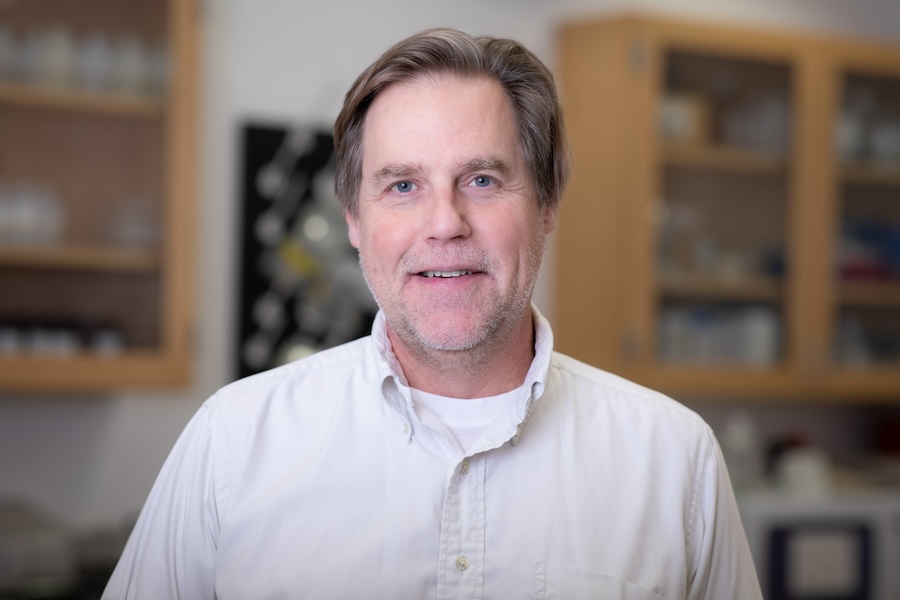
A Florida State University researcher has been recognized by the Tallahassee Scientific Society for his commitment to science education and outreach and his contributions to science.
Professor of Biological Science Jonathan Dennis received the 2024 Gold Medal Award, which has been presented annually since 2004 to a scientist from Tallahassee and the greater Big Bend region for exemplary career achievement and an outstanding dedication to science education and outreach.
“As it sank in that I won the Gold Medal Award, I felt deeply honored to be recognized in this manner alongside previous winners who are inspirations to me,” Dennis said. “It drives me to continue pushing myself to contribute to research and scientific teaching in ways that make a positive impact.”
All but one of the award’s 21 recipients have been FSU faculty, staff or alumni, including the late Robert O. Lawton Distinguished Professor and Professor Emeritus Michael Kasha and the late Sir Harold Kroto, Nobel Laureate and the driving force behind FSU’s Global Educational Outreach for Science, Engineering and Technology program.
Dennis received the award Thursday, Jan. 23, at the Challenger Learning Center of Tallahassee. Following the award presentation, Dennis kicked off the TSS’ annual Horizon Speaker Series with a presentation on the promise of epigenetics and precision medicine.
“Jonathan is a world expert on the inner workings of the cell’s nucleus and the manner in which DNA is untangled to allow expression of the genetic blueprint — in both health and disease,” said Thomas Houpt, chair of the Department of Biological Science. “The Gold Medal Award demonstrates FSU research’s impact on the local community — Jonathan’s establishment of the COVID-19 testing center in 2020 was essential to FSU and Tallahassee’s navigation of the pandemic and undoubtedly saved lives.”
In every cell of the human body exists a chain of DNA that is more than two meters long and compressed into a cell’s nucleus, boasting a diameter of approximately five one-thousandths of a millimeter, or 1/15th the width of a single human hair. By examining how the body organizes DNA within its cells, Dennis’ cell and molecular biology research lab studies the relationship between DNA organization in the nucleus and the function of different cell types, such as neurons in the brain and white blood cells in the immune system. This work informs advanced understanding of how the organization of DNA contributes to the origin and mechanisms of disease.
As the scientific director of the TMH-FSU Rapid Response Laboratory, which ran from 2020 to 2022, Dennis was instrumental in developing a system that could test high volumes of students and patients in the greater Big Bend region for COVID-19 in a same-day window. At the time, testing supplies were in short supply, and Dennis overcame the problem by sourcing alternate materials than those in the premade testing kits.
“I think challenging times ignite something in me that apparently easier times do not,” Dennis said. “The 2020-2022 academic years were among my most productive with two of my highest-profile publications. The COVID-19 detection work was the most rewarding of my entire career, and having the privilege to drive substantive change that saves lives is incredible.”
Since 2016, Dennis has also been a professor in FSU’s Young Scholars Program, a six-week residential summer program for 40 of Florida’s highest-performing high school students with significant potential for careers in the fields of science, technology, engineering and mathematics. In collaboration with the Mayo Clinic, Dennis also conducts pioneering work on cancer diagnostics, specifically the intersection of epigenetics — the annotations in one’s DNA made by lifestyle factors like diet and stress — cancer subtypes and social justice, which was the focus of his Gold Medal Award talk.
“High-quality, fun and objective scientific education and outreach lie at the core of an informed citizenry,” Dennis said. “Science means little if scientists only communicate their findings with one another at their annual professional meetings. The education and outreach work reminds me to keep a broad perspective and allows me to reset my scientific compass.”
To learn more about Dennis’ work and the Department of Biological Science at FSU, visit bio.fsu.edu.



